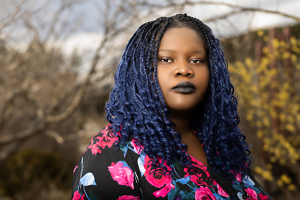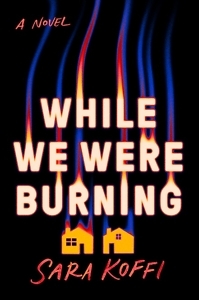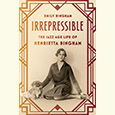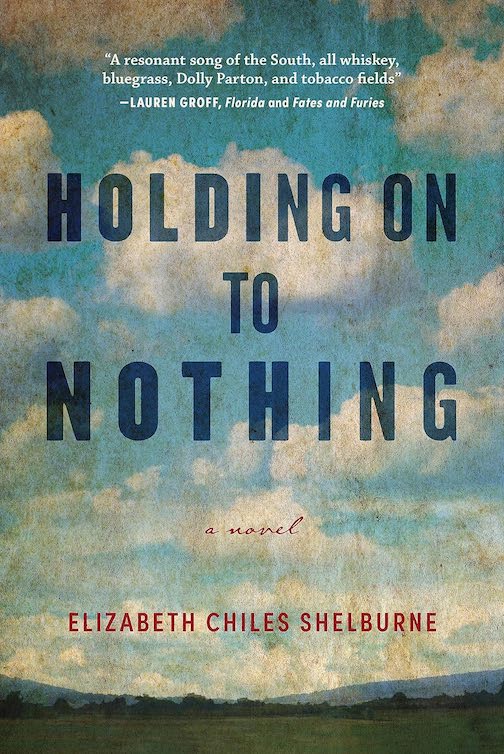Memphis Mourning
Sara Koffi’s fast-paced debut thriller packs commentary on racism, police brutality, and inequality
In her website bio, Memphis novelist Sara Koffi describes herself as a writer who seeks to “humanize Black women by giving them space on the page” and “explore the nuances of ‘unlikeable female characters.’” As the Brits might say with a raised forefinger, “tick” and “tick.” Koffi does both in her widely anticipated debut While We Were Burning, a thriller with a plot that hinges on the killing of a Black teen reminiscent of Trayvon Martin. But in this case, it’s the police, not the 911 caller, who take the unfortunate young man’s life as he rides his bike in the upscale Memphis neighborhood of Harbor Town.

But readers never really meet that victim. Instead, the novel centers on the stories of his family members and the privileged community where he drew his last breath. When readers first meet protagonist Elizabeth Smith, a white woman who lives with her wildly successful husband in Harbor Town, she is talking about her marital discontent with a man she believes no longer sees her. But as any angst-ridden spouse can attest, a community’s social norms go on even when a marriage is unraveling — maybe especially when that’s happening. Elizabeth and her husband, David, put on their real and metaphorical masks to host a Halloween party that draws friends and neighbors, including Jack and Patricia, the latter a convenient, and begrudging, best friend who volunteers at the tutoring center where Elizabeth works.
Before the party, Patricia badgers her friend about joining the new local Neighborhood Watch, an idea Elizabeth resists. The conversation gives readers the clear sense that bored, rich Patricia might just be the racist next door. The party ensues, and as the evening winds down the two friends make plans to take a walk together early the next morning, a first.
“Even though we’d never be genuinely close, I couldn’t deny that she fulfilled the role of friend, over and above,” the narrator Elizabeth says of Patricia. “Shit. What did that say about me? That a woman that I’d found various ways to tolerate was the closest thing I had to a fucking friend.”
 This is a thriller, after all, so let’s just say that Elizabeth doesn’t have to tolerate Patricia for long. Elizabeth finds her the next morning hanging from a lamppost, her shoes having fallen off her feet and onto the pavement. Against all odds, Patricia’s death is ruled a suicide and sets in motion more instability for Elizabeth, who, much to David’s chagrin, is obsessed with finding the real killer. She is so beside herself at the loss of her false friend that she begins taking anti-anxiety medication just to get through the day. David, once distant, becomes doting and solicitous — but with a huge dollop of controlling. He suggests she hire a personal assistant to help with the house, her meds, and her work.
This is a thriller, after all, so let’s just say that Elizabeth doesn’t have to tolerate Patricia for long. Elizabeth finds her the next morning hanging from a lamppost, her shoes having fallen off her feet and onto the pavement. Against all odds, Patricia’s death is ruled a suicide and sets in motion more instability for Elizabeth, who, much to David’s chagrin, is obsessed with finding the real killer. She is so beside herself at the loss of her false friend that she begins taking anti-anxiety medication just to get through the day. David, once distant, becomes doting and solicitous — but with a huge dollop of controlling. He suggests she hire a personal assistant to help with the house, her meds, and her work.
So enters Brianna, a beautiful Black woman who has infiltrated the Harbor Town private social media group and sees Elizabeth’s message asking for any leads on a potential assistant. What no one else knows is that Brianna, who alternately narrates the thriller, wants to be a nurse, not a personal assistant. Elizabeth doesn’t know the truth about Brianna’s past and the real reason she has shown up to interview for the job.
Koffi is a Memphis native who graduated with a B.A. from Whittier College, and her first novel is ambitious in all that it tries to confront: the kind of racism every Tennessean knows is pervasive in Memphis and beyond, police brutality and the ensuing mistrust of law enforcement, and inequality — not just in our culture generally but also in marriages and friendships. Koffi’s execution isn’t perfect. Some reviewers have noted shortcomings in character development, for example. But the pace is stunningly lively; the plot is workmanlike; and the characters are complex enough to surprise and enlighten.
In addition, Koffi manages to condemn societal injustices without being preachy or heavy-handed, without sacrificing the plot for the message — no small feat for a fledgling author. Fans of the thriller genre might tolerate some measure of an agenda with their crack fiction, but what they mostly want is to forget about their problems and to take a little vacation without leaving the couch.
Koffi also isn’t afraid for a Black character to go without a halo, which is as much of a hint as we’re willing to give about how this novel ultimately ends.

Liz Garrigan is a former editor of the Nashville Scene and now teaches in Bangkok, Thailand.


